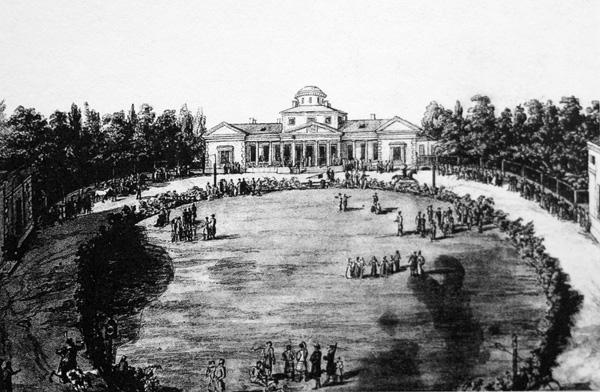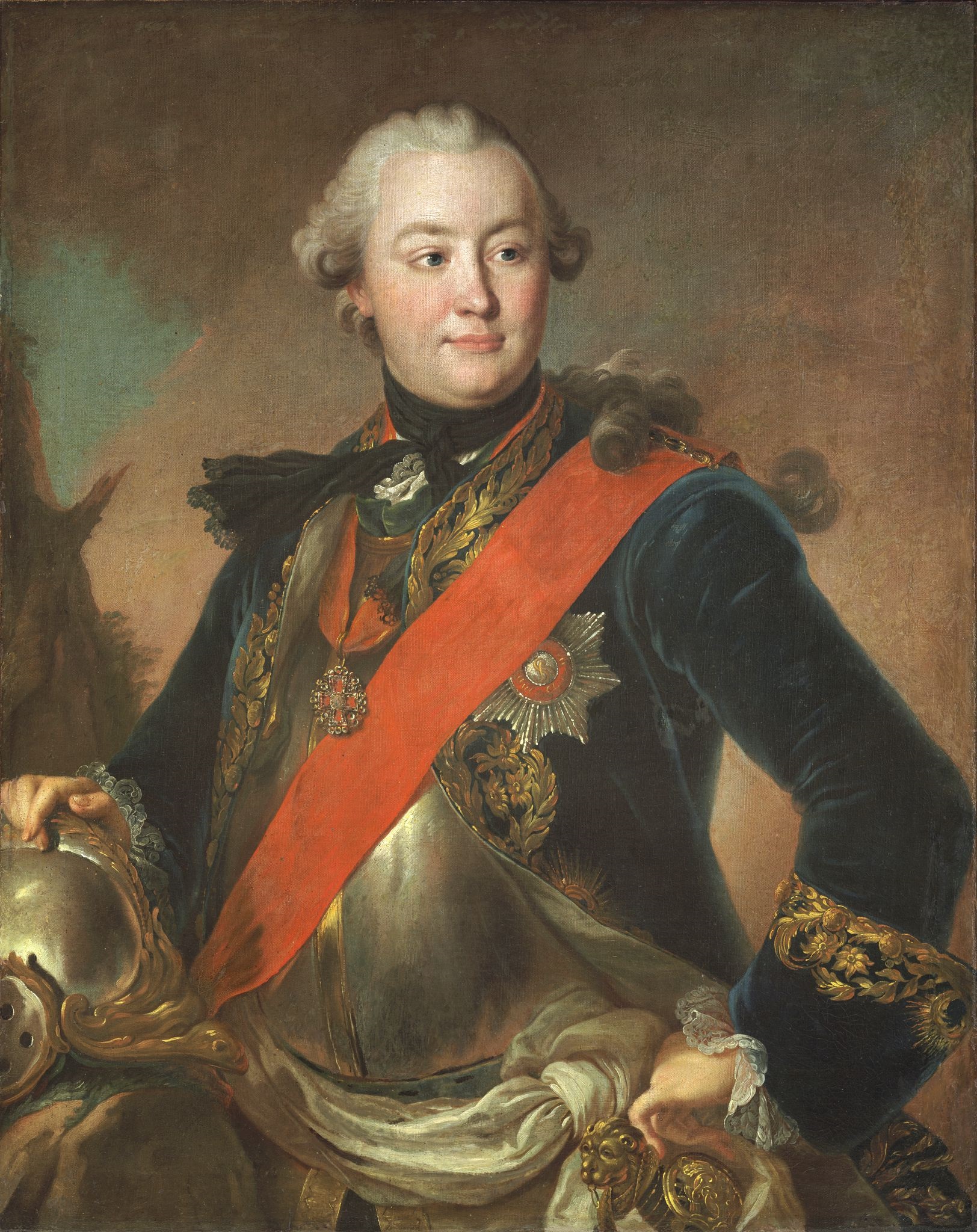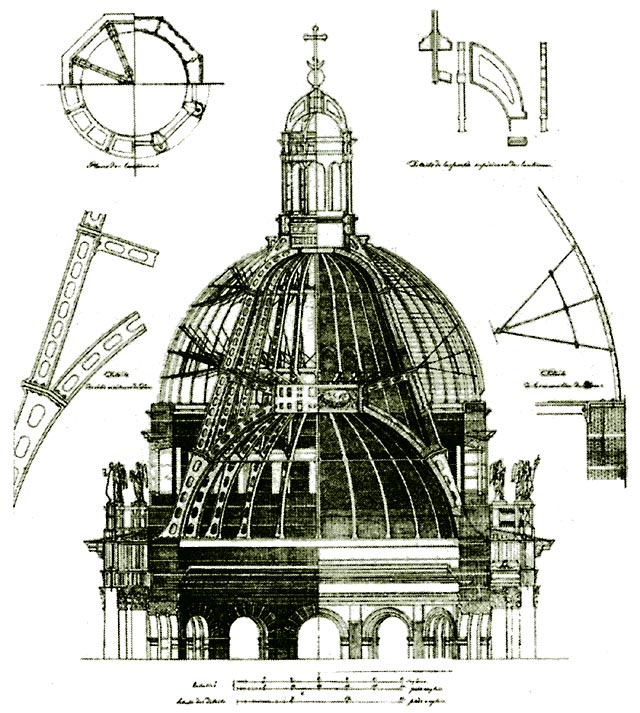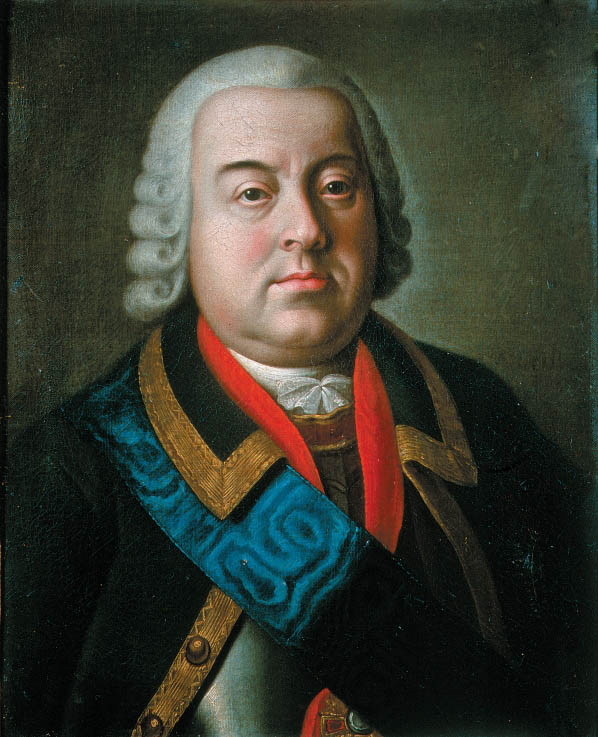|
Alexander Vyazemsky
Prince Alexander Alekseevich Vyazemsky (russian: Александр Алексеевич Вяземский; 14 August 1727 – 20 January 1793) was one of the trusted dignitaries of Catherine the Great, Catherine II, who, as the Prosecutor general of the Russian Empire, Prosecutor General of the Governing Senate, Senate, monitored the spending of state funds and had a reputation as incorruptible. Biography Vyazemsky was born on 14 August 1727. He belonged to a princely family, originating from the grandson of Vladimir II Monomakh, Vladimir Monomakh – Prince Rostislav I of Kiev, Rostislav Mstislavich. At the age of twenty, Alexander Alekseevich graduated from the First Cadet Corps, Land Gentry Corps. During the Seven Years' War with Prussia, he participated not only in the battles of the Russian Army, but also in the implementation of some secret (presumably, intelligence) orders of the command, which almost cost him his life. By the end of the war, Alexander Vyazemsky already hel ... [...More Info...] [...Related Items...] OR: [Wikipedia] [Google] [Baidu] |
Aleksandr Bibikov
Aleksandr Ilyich Bibikov (russian: Алекса́ндр Ильи́ч Би́биков) (, Moscow – , Bugulma) was a Russian statesman and military officer. Bibikov came from an old noble family; Field Marshal Mikhail Kutuzov was his brother-in-law. He began his military service in 1746, participating in the Seven Years' War (1756–1763). He was unit commander in the Battle of Zorndorf. His unit lost 60 officers and about half of the soldiers but did not retreat. He was promoted to Colonel Rank by Empress Elizabeth of Russia. He also participated in Battle of Kunersdorf and thereafter was appointed military commandant of Frankfurt. Bibikov acted against the Polish Bar Confederation (1771–1774). In 1773 Bibikov was assigned to suppress Yemelyan Pugachev's uprising. In March 1774, Bibikov forced Pugachev's rebel army to abandon its siege on the city of Orenburg. By spring 1774, Bibikov had earned the rank of General and he defeated Pugachev at Tatishchevo, west of Orenburg. I ... [...More Info...] [...Related Items...] OR: [Wikipedia] [Google] [Baidu] |
Niels Rosenkrantz
Niels Rosenkrantz (9 September 1757 in Øyestad, Norway - 6 January 1824 in Copenhagen) was a Danish-Norwegian statesman, diplomat and prime minister. He was the son of Otto Christian Rosenkrantz and Karen Johanne Rønning. After a short time of service in the military, Niels Rosenkrantz began to serve as a diplomat. In 1783, he was appointed as the Danish minister in The Hague. In 1784, he was assigned as the Danish minister in St. Petersburg. He became the Danish minister in residence of Warsaw in 1787. He served as the Danish Chamberlain and charge d'affaires at the Russian court in 1789. In 1795, he served as the Danish ambassador to the Prussian court in Berlin. In 1800, he was appointed as an ambassador to the Russian court. That same year, he became a knight of the Order of Dannebrog. In 1801, he was ordered by Czar Paul I to immediately leave Russia. He was re-invited to be the ambassador to the Russian court 1802-04 following Paul I's assassination and the ascension o ... [...More Info...] [...Related Items...] OR: [Wikipedia] [Google] [Baidu] |
Grigory Orlov
Prince Grigory Grigoryevich Orlov (russian: Князь Григорий Григорьевич Орлов; 6 October 1734, Bezhetsky Uyezd – 13 April 1783, Moscow) was a favourite of the Empress Catherine the Great of Russia. He became a leader of the 1762 coup which overthrew Catherine's husband Peter III of Russia and installed Catherine as empress. For some years he was virtually co-ruler with her, but his repeated infidelities and the enmity of Catherine's other advisers led to his fall from power. Overthrow of Peter Orlov was the son of Gregory Orlov, governor of Great Novgorod. He had a younger brother Alexei Grigoryevich Orlov who would equally gain military and political prominence in Russia. Grigory Orlov was educated in the corps of cadets at Saint Petersburg, began his military career in the Seven Years' War, and was wounded at Zorndorf. While serving in the capital as an artillery officer, he caught the fancy of the then Grand Duchess Catherine Alekseyevna, and ... [...More Info...] [...Related Items...] OR: [Wikipedia] [Google] [Baidu] |
Saint Isaac's Cathedral
Saint Isaac's Cathedral or Isaakievskiy Sobor (russian: Исаа́киевский Собо́р) is a large architectural landmark cathedral that currently functions as a museum with occasional church services in Saint Petersburg, Russia. It is dedicated to Saint Isaac of Dalmatia, a patron saint of Peter the Great, who had been born on the feast day of that saint. It was originally built as a cathedral but was turned into a museum by the Soviet government in 1931 and has remained a museum ever since, with church services held in a side chapel since the 1990's. In 2017, the Governor of Saint Petersburg offered to transfer the cathedral back to the Russian Orthodox Church, but this was not accomplished due to the protests of St Petersburg citizens opposing the offer. History The church on St Isaac's Square was ordered by Tsar Alexander I, to replace an earlier structure by Vincenzo Brenna, and was the fourth consecutive church standing at this place. A specially appointed com ... [...More Info...] [...Related Items...] OR: [Wikipedia] [Google] [Baidu] |
Nikita Trubetskoy
Prince Nikita Yurievich Trubetskoy (Russian: ''Никита Юрьевич Трубецкой'') (26 May 1699 – 16 October 1767) was a Russian statesman and Field Marshal (1756), minister of defense of Russia 1760. His parents were general-poruchik and senator Prince Yuri Yurievich Troubetzkoy (20 April 1668 – 8 September 1739), who was governor of Belgorod, and Princess Elena Grigorievna Tcherkassky (b. before 1696). In 1715-1717, Nikita Trubetskoy was educated abroad. He started his military career as the batman of Peter I. In 1722 he joined the Preobrazhensky Regiment in the rank of sergeant and promoted to ensign in 1722.Journal of Kammer-junker Cercholz 11, 190 In 1730, Trubetskoy was one of staunch opponents of the Supreme Privy Council and supported the empress Anna Ivanovna. He had taken part in all of the Russian wars until 1740, then he presided the Voiennaia Kolleguia (ministere of army). He was appointed General-Prosecutor of the Governing Senate. Trubetskoy ... [...More Info...] [...Related Items...] OR: [Wikipedia] [Google] [Baidu] |
Annunciation Church Of The Alexander Nevsky Lavra
The Annunciation Church of the Alexander Nevsky Lavra (russian: Благовещенская церковь Александро-Невской лавры), or in full, the Church of the Blessing of the Most Holy Virgin and the Holy Blessed Prince Alexander Nevsky (russian: Це́рковь Благове́щения Пресвято́й Богоро́дицы и свято́го благове́рного кня́зя Алекса́ндра Не́вского) is a Russian Orthodox church in Saint Petersburg. It is in the and is part of the Alexander Nevsky Lavra. The church was one of the earliest buildings in the monastery complex, begun in 1719 and completed by 1725. The building contained two churches, the upper floor was dedicated to Saint Alexander Nevsky and was built to hold his relics, installed when the church was consecrated in 1724. The church on the ground floor, originally planned to be the monastery refectory, was dedicated to the annunciation of the Virgin Mary ... [...More Info...] [...Related Items...] OR: [Wikipedia] [Google] [Baidu] |
Dmitri Bantysh-Kamensky
Dmitri Bantysh-Kamensky (5 (16) November 1788, Moscow – January 25 (February 6) 1850, Saint Petersburg) was a Russian statesman and historian who studied under pioneering 18th century historian G. F. Müller He served as Governor of Tobolsk Province between March 1825 and 20 July 1828 and then later became Governor of the Vilna Province between May 1836 and 1838. Dmitri Bantysh-Kamensky is considered the first true historian of the Cossacks. Biography Dmitri Bantysh-Kamensky was the son of noted archivist and historian Nikolai Nikolaevich Bantysh-Kamensky. Bantysh-Kamensky who was educated at home, became a cadet in 1800 the Cadet Corps and gained a place in the Moscow archive of the Foreign College whose director was his father. Being sent to Serbia, Bantysh-Kamensky had the opportunity to survey Ukraine and the countries lying along the way, which he described in his "Journey to Moldavia, Wallachia and Serbia" (M., 1810 ). In 1812, Bantysh-Kamensky accompanied his fa ... [...More Info...] [...Related Items...] OR: [Wikipedia] [Google] [Baidu] |
Active Privy Councillor
Active Privy Councillor (russian: действительный тайный советник, deystvitelnyi taynyi sovetnik) was the civil rank (ru: чин / chin) in the Russian Empire, according to the Table of Ranks introduced by Peter the Great in 1722. That was a civil rank of the 2nd class and equal to those of General-in-Chief in the Army and Admiral in the Navy. The rank holder should be addressed as '' Your High Excellency'' (russian: Ваше Высокопревосходительство, Vashe Vysokoprevoskhoditelstvo). If the Foreign Minister had the rank of the 2nd class, he could be called Vice-Chancellor. Overview Those who had the rank occupied the highest public offices available. The Senate employed the majority of them. Not every minister, especially early in his tenure, might have the rank. Most of Active privy councillors lived in St. Petersburg; they served in the main state institutions: the Council of State and the most important Ministries. In 1903, there ... [...More Info...] [...Related Items...] OR: [Wikipedia] [Google] [Baidu] |
Governorate (Russia)
A governorate, gubernia, province, or government ( rus, губе́рния, p=ɡʊˈbʲɛrnʲɪjə, also romanized ; uk, губернія, huberniia), was a major and principal administrative subdivision of the Russian Empire. After the empire was ended by revolution, they remained as subdivisions in Belarus, the Russian republic, Ukraine, and in the Soviet Union from its formation until 1929. The term is also translated as ''government'', ''governorate'', or ''province''. A governorate was ruled by a governor (, ''gubernator''), a word borrowed from Latin , in turn from Greek . Selected governorates were united under an assigned governor general such as the Grand Duchy of Finland, Congress Poland, Russian Turkestan and others. There also were military governors such as Kronstadt, Vladivostok, and others. Aside from governorates, other types of divisions were oblasts (region) and okrugs (district). First reform This subdivision type was created by the edict (ukase) of Peter ... [...More Info...] [...Related Items...] OR: [Wikipedia] [Google] [Baidu] |
Alexander Pushkin
Alexander Sergeyevich Pushkin (; rus, links=no, Александр Сергеевич ПушкинIn pre-Revolutionary script, his name was written ., r=Aleksandr Sergeyevich Pushkin, p=ɐlʲɪkˈsandr sʲɪrˈɡʲe(j)ɪvʲɪtɕ ˈpuʂkʲɪn, a=ru-Pushkin.ogg; ) was a Russian poet, playwright, and novelist of the Romantic era.Basker, Michael. Pushkin and Romanticism. In Ferber, Michael, ed., ''A Companion to European Romanticism''. Oxford: Blackwell, 2005. He is considered by many to be the greatest Russian poetShort biography from University of Virginia . Retrieved 24 November 2006.Allan Rei ... [...More Info...] [...Related Items...] OR: [Wikipedia] [Google] [Baidu] |
Nikolay Novikov
Nikolay Ivanovich Novikov (russian: Никола́й Ива́нович Новико́в) (, Moscow Governorate – . Moscow Governorate) was a Russian writer and philanthropy, philanthropist most representative of his country's Russian Enlightenment, Enlightenment. Frequently considered to be the first Russian journalist, he aimed at advancing the cultural and educational level of the Russian public. Novikov belonged to the first generation of Russians that benefited from the creation of Moscow University in 1755. He took an active part in the nakaz, Legislative Assembly of 1767, which sought to produce a new code of laws. Inspired by this kind of freethinking activity, he took over editing the ''Moscow News (Imperial Russia), Moscow Gazette'' and launched satirical Magazine, journals, including ''Zhivopisets'', patterned after ''Tatler (1709), The Tatler'' and ''The Spectator''. His attacks on the existing social customs prompted jocund retorts from Catherine the Great, who even ... [...More Info...] [...Related Items...] OR: [Wikipedia] [Google] [Baidu] |






